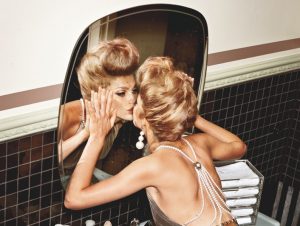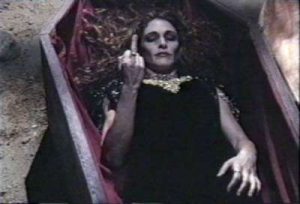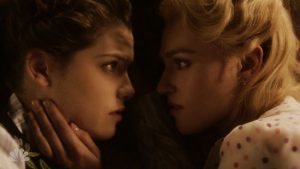
When reading “Venus and Mars” by Katherine Bradley and Edith Cooper (pseud: Michael Field), it is hard not to think about themes of sexuality, particularly as it pertains to women. I instantly thought of some lines from Freud’s Creative Writers and Day Dreamers:
“…the impulse to create fantasies is universally present… the artist dreams aloud and in public…” (420).
There are several lines from “Venus and Mars” that I think embody a certain fantasy or dream; that of a woman empowered. For example, “She is a fate, although / She lies upon the grass” (1-2). We are introduced in the beginning lines of the poem to our Venus; a woman in a relaxed pose yet containing some supreme power. There is also something ancient and natural about her; “She rears from off the ground / As if her body grew / Triumphant as a stem” (27-28).
Venus is also acutely aware of her power, and that she has harnessed it; “…her eyes alert ; they search and weigh / The god, supine, who fell from her caress / When love had had its sway” (34-36). Venus has put Mars in a death-like slumber through her own prowess. Whether this has an explicit sexual connotation or not, the implication is that Venus has wielded herself to take down a godly figure.
Perhaps the idea of a woman loudly and powerfully sexual was appealing to Field because they wanted to desperately for women to have more power. Venus represents a strong female figure using her sexual charms to destroy a version of patriarchy. “…his naked limbs, their fury spent, Are fallen in wearied curves” (47-48) – Mars cannot even move after his interaction with her.
Katherine Bradley and Edith Cooper felt constantly that the pseudonym of Field needed to be maintained in order to both sell their work and receive honest critiques. This double-edged sword of hidden identity comes with the price of succeeding to the powerlessness of womanhood during the Victorian Era. Bradley and Cooper knew that no one would take their work seriously if it was known two female authors produced it. Because of this, it makes sense that the pair would portray strong female characters to fulfill a secret wish of having their own agency.
Yet even then there is still a shame of womanhood that carries through into the poem. “Ironical she sees, Without regret, the work her kiss has done / And lives a cold enchantress doomed to please / Her victims one by one” (81-84). Venus is not ashamed of her dominance over Mars, yet she is fated to continue to perform over him and possibly others forever more. Venus may have a sexual prowess, but she does not have the power to decide when to use it. This stanza sends a few mixed messages about female sexuality. Firstly that it is okay to be proud of one’s beauty and sexual desires or actions, but secondly, that if you are a beautiful and sexual woman then you cannot really choose another path. The control a woman feels over her sexuality, while empowering, is false, and only serves to placate women while the status quo prevails.


